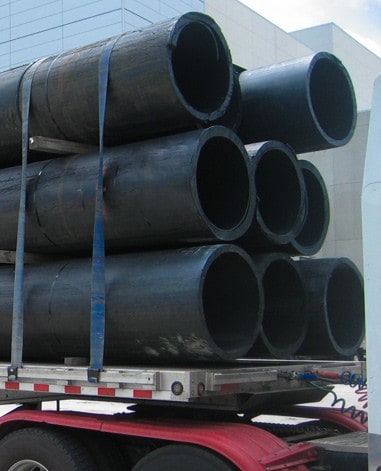American Plastics HDPE Pipe for Oilfield: Durability in Harsh Environments
Wiki Article
Recognizing the Trick Advantages of HDPE Pipe for Water and Wastewater Monitoring
The use of HDPE pipeline in water and wastewater administration provides countless advantages that warrant factor to consider. Its remarkable sturdiness and long life-span make it a favored option for lots of jobs. Furthermore, the product's resistance to rust and chemical damages improves its integrity in different settings. Nonetheless, the benefits prolong beyond simply longevity and resistance. Exploring its cost-effectiveness and ecological impact reveals much more engaging reasons for its extensive fostering in contemporary facilitiesExtraordinary Resilience and Durability

HDPE pipe sticks out for its extraordinary longevity and long life, making it a favored choice in water monitoring systems. Constructed from high-density polyethylene, these pipes can stand up to significant pressure and stress, guaranteeing reliable performance with time. Their durable nature allows them to endure severe ecological problems, including temperature level changes and soil activities, which can cause other materials to fail.
The lifespan of HDPE pipelines typically exceeds 50 years, giving a cost-effective option for towns and markets alike. Additionally, the material's lightweight residential or commercial properties simplify installation, reducing labor prices and timeframes. This sturdiness lessens the requirement for frequent fixings or replacements, better improving its economic appeal.
In water management applications, the dependability of HDPE pipes suggests less disturbances and boosted solution continuity, making them essential to lasting infrastructure advancement. The mix of toughness and durability strengthens HDPE's role as a keystone in efficient water monitoring remedies.

Resistance to Deterioration and Chemical Damages
While lots of products catch deterioration and chemical damages gradually, HDPE pipelines exhibit exceptional resistance, making them suitable for various water administration applications. This strength stems from the molecular framework of high-density polyethylene, which is inherently non-reactive and does not rust like steels or break down from direct exposure to rough chemicals. Because of this, HDPE is very efficient in settings with aggressive materials, such as wastewater systems that might have acids, bases, and natural solvents.
Additionally, HDPE pipes can endure environmental factors such as dirt acidity and saline conditions, additionally boosting their suitability for diverse applications (American Plastics HDPE Pipe Manufacturing). Their capacity to preserve architectural stability gradually reduces the danger of leaks and failings, which is crucial in making sure the safety and reliability of water distribution and wastewater management systems. The resistance to corrosion and chemical damages markedly adds to the overall efficiency and longevity of HDPE piping options.
Cost-Effectiveness and Financial Advantages
When thinking about the financial effects of water management systems, the cost-effectiveness of HDPE pipes becomes evident. These pipelines provide reduced setup and maintenance prices compared to conventional products like metal or concrete. Their light-weight nature streamlines transportation and setup, resulting in decreased labor expenses. In addition, HDPE pipelines show a long lifespan, commonly going beyond half a century, which equates to less replacements and long-lasting financial savings.Additionally, the resistance of HDPE to deterioration and chemical damages reduces the requirement for costly repairs and substitutes. The pipelines additionally support efficient water flow, decreasing energy prices connected with pumping systems. By pipe fix plumbing mitigating leakages and water loss, HDPE pipes add to significant financial advantages for communities and sectors alike. Overall, the initial financial investment in HDPE piping can produce considerable monetary returns over the lifespan of the water management system, making it Get More Info a sensible option for lasting framework growth.
Ecological Sustainability and Decreased Effect

Versatility and Adaptability in Setup
As a result of their special homes, HDPE pipes supply impressive convenience and versatility in installment, making them suitable for a large range of applications. Their lightweight nature permits less complicated handling and transportation, reducing labor expenses and setup time. HDPE pipes can be bent and formed to fit numerous terrains and job requirements, which discover this info here is specifically valuable in testing environments.In addition, their resistance to corrosion and chemical damage enables installment in diverse settings without the demand for specialized protective finishes. The ability to fuse joints creates a constant, leak-free system, enhancing the general stability and reliability of the installment. HDPE's flexibility also suits ground movement, decreasing the threat of damages in locations prone to changing soil. In general, these attributes make HDPE pipes not only flexible yet also a favored selection for water and wastewater administration systems.
Frequently Asked Questions
Exactly How Does HDPE Pipe Compare to PVC in Water Management Applications?
HDPE pipeline supplies premium adaptability, resistance to corrosion, and longevity compared to PVC. Its lighter weight assists in simpler setup, while its long life expectancy lowers substitute expenses, making HDPE a favored option in water management applications.What Is the Life-span of HDPE Pipeline Under Regular Problems?
Under regular problems, HDPE pipes can have a life expectancy ranging from 50 to 100 years. Their toughness and resistance to corrosion add to their lasting performance in various applications, making them a trustworthy selection for infrastructure.Are HDPE Pipes Recyclable After Their Service Life?
Yes, HDPE pipelines are recyclable after their solution life. American Plastics HDPE Pipe Manufacturing. They can be processed and repurposed into new products, greatly minimizing environmental effect and promoting sustainability within the industry, making them a green choice for piping solutionsWhat Is the Setup Refine for HDPE Water Lines?
The installation procedure for HDPE pipes includes website preparation, trenching, pipeline combination or mechanical signing up with, backfilling, and pressure testing. Correct methods ensure a durable and effective system for carrying water and wastewater successfully.Can HDPE Piping Be Utilized for Both Safe And Clean and Non-Potable Water Solutions?
Yes, HDPE pipes can be made use of for both potable and non-potable water systems. Their convenience, resilience, and resistance to deterioration make them ideal for different applications, making certain risk-free and efficient transportation of water in different contexts.Report this wiki page